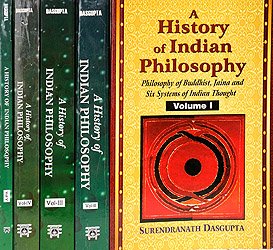A History of Indian Philosophy Volume 4
Indian Pluralism
by Surendranath Dasgupta | 1949 | 186,278 words | ISBN-13: 9788120804081
This page describes the philosophy of caitanya’s biographers: a concept having historical value dating from ancient India. This is the first part in the series called the “caitanya and his followers”, originally composed by Surendranath Dasgupta in the early 20th century.
Part 1 - Caitanya’s Biographers
Caitanya was the last of the Vaiṣṇava reformers who had succeeded Nimbārka and Vallabha. As a matter of fact, he was a junior contemporary of Vallabha. So far as he is known to us, he did not leave behind any work treating of his own philosophy, and all that we can know of it is from the writings of his contemporary and later admirers and biographers. Even from these we know more of his character and of the particular nature of his devotion to God than about his philosophy. It is therefore extremely difficult to point out anything as being the philosophy of Caitanya. Many biographies of him were written in Sanskrit, Bengali, Assamese and Oriya and a critical study of the materials of Caitanya’s biography in Bengali was published some time ago by Dr Biman Behari Mazumdar. Of the many biographies of Caitanya those by Murārigupta and Vṛndāvanadāsa deal with the first part of Caitanya’s life, and the latter’s work is regarded as the most authoritative and excellent treatment of his early life. Again, Kṛṣṇadāsa Kavirāja’s Life, which emphasizes the second and third parts of Caitanya’s life, is regarded as the most philosophical and instructive treatment of his most interesting period. Indeed, Vṛndāvanadāsa’s Caitanya-bhāgavata and Kṛṣṇadāsa Kavirāja’s Caitanya-caritāmṛta stand out as the most important biographical works on Caitanya. We have already mentioned Murārigupta, who wrote a small work in Sanskrit, full of exaggerations, though he was a contemporary.
There are also biographies by Jayānanda and Locanadāsa, entitled Caitanya-maṅgala. Some Govinda and Svarūpa Dāmodara, supposed to have been personal attendants of Caitanya, were said to have kept notes, but these are apparently now lost. Kavi Karṇapūra wrote the Caitany a-candrodaya-nātaka, which may be regarded as the principal source of Kṛṣṇadāsa Kavirāja’s work. Vṛndāvanadāsa was born in śaka 1429 (a.d. 1507); he had seen Caitanya during the first fifteen years of his life. Caitanya died in śaka 1455 (a.d. 1533) and the Caitanya-bhāgavata was written shortly after. Kṛṣṇadāsa Kavirāja’s work, Caitanya-caritāmṛtūy was written long afterwards. Though there is some dispute regarding the actual date of its completion, it is well-nigh certain that it was in śaka 1537 (a.d. 1616). The other date, found in Prema-vilāsa, is śaka 1503 (a.d. 1581), and this had been very well-combatted by Professor Rādhā Govinda Nath in his learned edition of the work. The Caitanya-candrodaya-nātaka was written by Kavi Karṇapūra in śaka 1494 (a.d. 1572). It would thus appear that for the most authentic account of Caitanya’s life one should refer to this work and to Vṛndāvanadāsa’s Caitanya-bhāgavata. Kavirāja Kṛṣṇadāsa’s Caitanya-caritāmṛta is, however, the most learned of the biographies. There was also a Caitanya-sahasra-nāma by Sārvabhauma Bhaṭṭācārya, the Govinda-vijaya of Paramā-nandapurī, songs of Caitanya by Gauridāsa Paṇḍita, the Gauḍarāja-vijaya of Paramānanda Gupta, and songs of Caitanya by Gopāla Basu.
